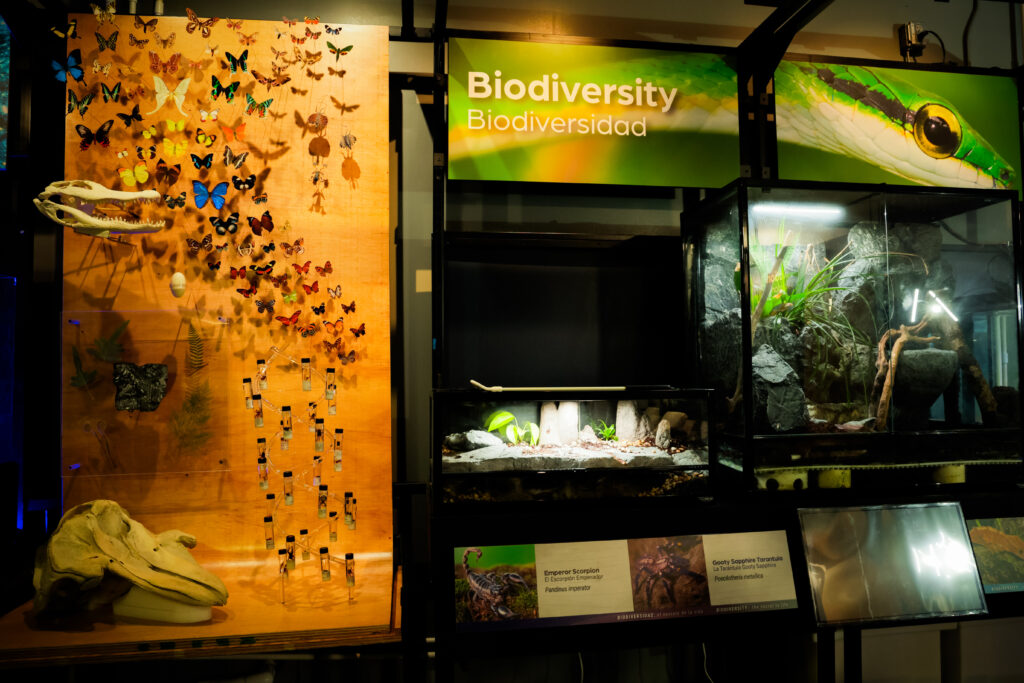February 20, 2025
Living Planet Lab Opens February 22 at Discovery Place Science
Media Contact: Alyssa Mulliger | amulliger@discoveryplace.org
New features provide hands-on opportunities for more in-depth exploration of biodiversity and sustainability; lab access is included in General Admission

CHARLOTTE, NC (February 20, 2025) – Discovery Place Science will open its reimagined Living Planet Lab on Saturday, February 22 following recent renovations to the space, formerly called Explore More Life. Located on Level 1 at Discovery Place Science, the Living Planet Lab explores Earth’s biodiversity and the importance of sustainability through new hands-on learning opportunities and current research that uncovers the complex systems that influence and sustain life.
“As a leading science museum in the country, Discovery Place Science is excited to amplify conversations around biodiversity and environmental stewardship through the Living Planet Lab,” said Catherine Horne, Discovery Place President and CEO. “We continue to find ways to bring critical scientific and environmental topics into the forefront of our work and visitor experiences, knowing we have a shared responsibility to educate our community through our exhibits, lab spaces and programming.”
At four new focus stations in the Living Planet Lab, living and non-living specimens from the Museum’s permanent Collections are paired with digital interactives that highlight stories of science, nature and design. The Living Planet Lab focus stations are:
Resilience – exploring how life continues from one generation to the next. For the first time ever, the process of how Discovery Place propagates jellyfish is on exhibit for visitors to experience.
Biodiversity – manifesting the idea that survival of any single species depends on the diversity of all species. The richness of life on Earth is shown through a variety of specimen displays including a crested gecko, shamefaced crab, tarantula and collection of butterflies and spiders.
Human Impact – challenging humans to look at the impacts that a growing population has had on other species and the planet. Discovery Place’s corals are displayed to tell the story of the impact of changing oceans on coral reefs around the world.
Action – encouraging conservation, sustainability and strategic thinking around how humans fit into the planetary ecosystem. An impressive mangrove tree on display serves as an example of the importance of humankind’s partnership with plants.
“The Living Planet Lab is helping to tell the story of how Discovery Place is actively involved in making a difference – from engaging our community, collaborating with researchers and participating in conservation efforts locally and around the world,” said Heather Norton, Chief Science Officer at Discovery Place. “This lab encourages our community to understand how everyone has a role to play in protecting our planet and how we all can support the well-being of individuals and communities.”
Throughout the Living Planet Lab are core experiences exploring coevolution, nature patterns, phylogeny and more. Visitors have an opportunity to learn about a wide range of marine animals at the lab’s hands-on touch tank, as well as get a closer look at the Museum’s Animal Ambassadors.
Additionally, a large tank at the entrance to the Living Planet Lab pulls back the curtain to show how habitats are recreated by the Discovery Place team to allow for the plants and animals in the Museum’s care to live comfortably and happily.
The Living Planet Lab is open daily and included in General Admission to Discovery Place Science. Images for media use can be downloaded here.
About Discovery Place Science
Discovery Place Science is the leading hub for science learning in the Carolinas—dedicated to the exchange of ideas, scientific exploration and creative expression to stimulate innovative problem-solving and learning. The Museum brings relevant, contemporary science to life through groundbreaking exhibitions, interactive educational programming and hands-on activities. Located in Uptown Charlotte at 168 W. 6th Street, convenient parking is available in the Museum’s parking deck—the Carol Grotnes Belk Complex—at the corner of Sixth and Church streets. For more information about Discovery Place Science, visit discoveryplace.org.